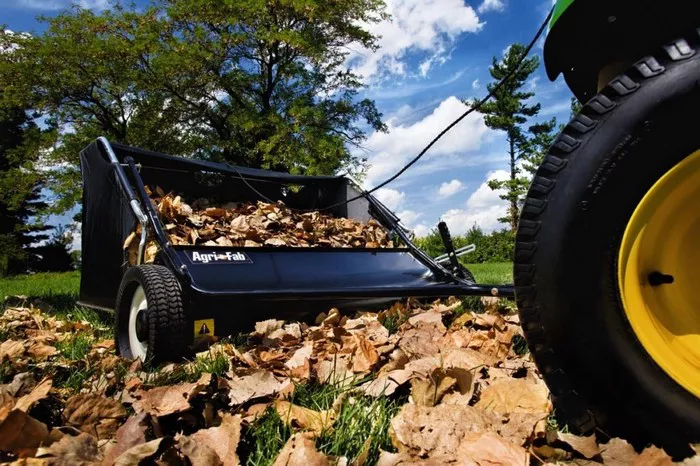Lawn sweepers are versatile tools commonly used by homeowners and landscaping professionals to maintain the cleanliness and aesthetic appeal of lawns and gardens. These machines, equipped with rotating brushes and collection hoppers, efficiently pick up lightweight debris such as leaves, grass clippings, and small twigs. The question arises, however, whether lawn sweepers can also be used to pick up dog poop. This article explores the capabilities and limitations of lawn sweepers concerning dog waste, examining design constraints, potential issues, and suitable alternatives for handling pet waste.
Lawn Sweeper Design Limitations
Lawn sweepers are engineered to manage dry, lightweight materials effortlessly. Their core components include rotating brushes that sweep debris into a collection hopper or bag. This design is highly effective for its intended purpose—gathering leaves, grass clippings, and other light detritus that litter lawns and gardens. However, this same design presents several limitations when faced with the task of picking up dog poop.
See also: Will a Lawn Sweeper Pick Up Grass Clippings?
Firstly, the brushes on a lawn sweeper are typically made of flexible bristles designed to push and lift light materials. Dog poop, particularly when fresh, is denser and stickier than the debris a lawn sweeper is designed to handle. The bristles are not equipped to grasp or lift such materials effectively, often resulting in the waste being smeared across the lawn rather than collected. This not only fails to achieve the desired cleanliness but also creates additional mess.
Secondly, the collection hoppers and bags on lawn sweepers are not suited for handling dense, moist substances. Dog waste can adhere to the interior surfaces of these components, leading to clogging and requiring frequent, unpleasant cleaning. The mechanisms that drive the brushes and move debris into the hopper can also be gummed up by the sticky consistency of dog poop, reducing the efficiency and lifespan of the sweeper.
Finally, the overall design of lawn sweepers does not account for the biological nature of dog waste. Unlike leaves and grass clippings, dog poop contains bacteria and other pathogens that can pose health risks if spread across a lawn or garden. The sweeping action can inadvertently smear the waste, increasing the likelihood of contamination and necessitating additional cleaning and sanitation measures.
Potential Issues and Risks
Using a lawn sweeper to pick up dog poop can result in several significant issues and risks that outweigh any potential convenience.
1. Mess and Ineffectiveness: As mentioned, the primary issue with using a lawn sweeper for dog poop is the inefficiency and mess it creates. The sweeper’s brushes are likely to spread the waste around rather than collecting it, leading to smeared poop on the lawn. This not only defeats the purpose of cleaning but also makes subsequent cleaning more challenging.
2. Mechanical Damage: The dense and sticky nature of dog waste can lead to clogging within the sweeper’s mechanism. The brushes, gears, and collection hoppers are not designed to handle such material, risking damage to the machine. Over time, repeated attempts to sweep up dog poop can cause wear and tear, reducing the sweeper’s overall effectiveness and lifespan. Repairing or replacing damaged components can also be costly.
3. Health Concerns: Dog waste is a biohazard, containing harmful bacteria, parasites, and viruses that can affect both humans and other animals. When spread by a lawn sweeper, these pathogens can contaminate the entire lawn, posing a health risk to anyone who comes into contact with the grass. This is particularly concerning for families with children or pets who frequently play on the lawn. Proper disposal of dog waste is crucial to maintaining a healthy environment, and using a lawn sweeper for this purpose can inadvertently contribute to the spread of disease.
See also: Street Sweeper Bristles
Alternatives to Lawn Sweepers for Dog Waste Removal
Given the significant limitations and risks associated with using lawn sweepers to pick up dog poop, it is important to consider alternative methods that are more effective and hygienic. Here are some recommended options:
1. Pooper Scoopers: These handheld tools are specifically designed for picking up dog waste. They come in various designs, including rake-and-pan models and claw-type grabbers, allowing for easy and sanitary collection of poop without direct contact. Pooper scoopers are effective on various surfaces, including grass, gravel, and pavement.
2. Waste Bag Dispensers: Carrying waste bags during walks ensures that dog owners can promptly pick up and dispose of their pet’s waste. Biodegradable bags are an environmentally friendly option, reducing the impact on landfills.
3. Dedicated Pet Waste Removal Services: Many communities offer pet waste removal services that visit homes to pick up and dispose of dog waste. These services provide a convenient solution for pet owners who prefer not to handle the waste themselves.
4. Enzyme Cleaners and Deodorizers: For areas where dog waste has been left for some time, enzyme cleaners and deodorizers can break down the organic matter and eliminate odors. These products are particularly useful for cleaning up after the initial waste has been removed.
5. Training and Prevention: Training dogs to use a specific area for their bathroom needs can help contain waste to a manageable location, making cleanup easier. Regularly cleaning these designated areas ensures that waste does not accumulate and spread.
Conclusion
In conclusion, lawn sweepers are not suitable for picking up dog poop. The design of these machines, optimized for lightweight and dry debris, is ill-equipped to handle the dense, sticky nature of dog waste. Attempting to use a lawn sweeper for this purpose can result in mess, mechanical damage, and health risks due to the spread of pathogens.
For effective and hygienic dog waste removal, pet owners should utilize tools specifically designed for this task, such as pooper scoopers and waste bag dispensers. These methods ensure that dog waste is properly collected and disposed of, maintaining the cleanliness and safety of lawns and gardens. By choosing the right tools and practices, pet owners can keep their outdoor spaces clean and healthy for everyone to enjoy.

